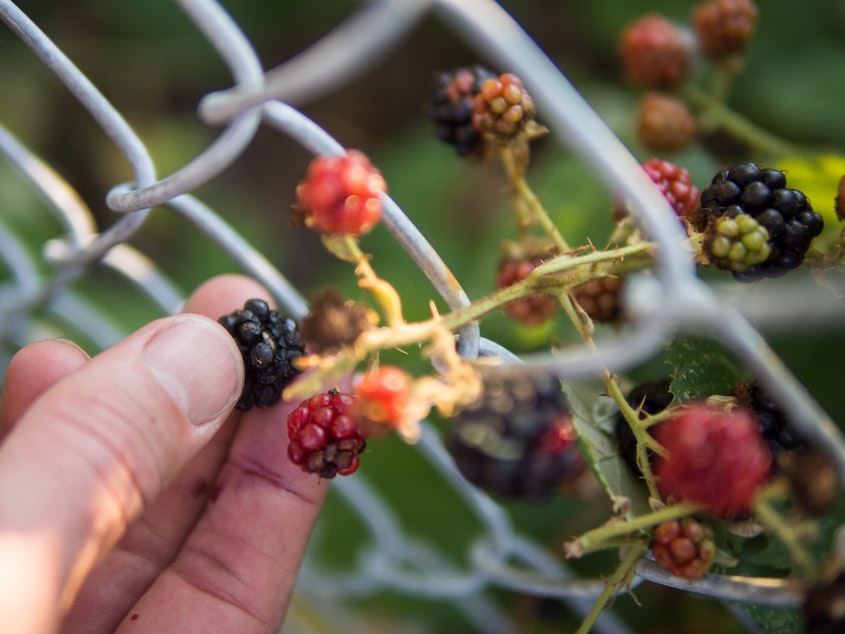Tips and tricks for safe urban foraging

It’s berry-picking season in the Northwest and blackberry bushes everywhere are loaded with fruit.
This prompted listener Colin Peterson to send us this question: “We love picking the blackberries in our neighborhood this time of year. And I was wondering about soil contamination and what impact that may or may not have on the berries we pick.”
I invited Peterson to join me at the Center for Urban Horticulture. That’s where we met Melany Vorass Herrera, a retired environmental policy analyst based in Olympia.
Vorass Herrera knows a thing or two about foraging. She wrote a book called "The Front Yard Forager," a guide to picking edible plants around the city.
Vorass Herrera said there are more hazards in industrial parts of the city, where there are warehouses, heavy equipment and storage drums.
"I would completely stay away from that," she said.

Sponsored
And as tempting as it is to pick berries near the freeway, Vorass Herrera said it’s better to harvest from the bushes you find in neighborhood alleyways where there’s not much traffic.
The issue is contaminants in the air.
“The vegetables we eat in the store, even the organic vegetables, are exposed to all kinds of airborne contaminants as well," she said.
Vorass Herrera recommends washing them. Berries, though, can be a challenge. That’s because it’s easy to nick them as you’re picking.
“You’ve introduced basically a pathway for anything on the berry to get into the berry,” she explained. “So what I recommend is picking as cleanly as you can; get only the ripe berries because they’ll just fall into your hand.”
Sponsored
Then when you get home, first give the berries a quick rinse. Then soak them in water for about 10 minutes before giving them another gentle rinse.
And the best part of foraging is enjoying the fruits of your labor, like turning those berries into jams or freezing them for later.
You don’t have to go very far to find edible plants to harvest. Dandelions, for example, may not be a gardener’s best friend, but the bitter greens boost the nutrition in your salad.
“It’s no different than radicchio or something like that you can purchase," said Vorass Herrera. “And bitters are good for you.”

Sponsored
Colin Peterson had another question: “You’ve got these beautiful P-Patches all around the city and they are next to roads, so many times I’ve often wondered about, we have a heavy rain after it’s been dry for a while and there’s always a bit of slick that kind of comes up with that.”
Peterson wanted to know to what extent does the slick get into the P-Patches.
“You’re not going to get rid of it,” Vorass Herrera said. “Plants will take up some, especially after that first flush.”
Plants will absorb some metals, she added. And certain plant families like the brassicas — broccoli, mustard and kale — will take in even more.
Sponsored
“In fact that’s why they’re so healthy: because they contain all kinds of trace metals that we need. They’re so good at taking up metals that they also take up the heavy stuff we don’t need,” she said.
In general, when the fruit is above the ground, it’s not a concern. John Kissel, professor emeritus at the University of Washington, specializes in human exposure to environmental contaminants.
“I’d be more leery of things like potatoes and carrots,” he said.
Root vegetables have direct contact with metals in the soil.
“It doesn’t have to dissolve in water to get there. It can simply attach to the root because it’s immediately adjacent to it," he said.
Sponsored
Kissel recommends growing vegetables on raised beds using clean soil that you can get at hardware stores.




